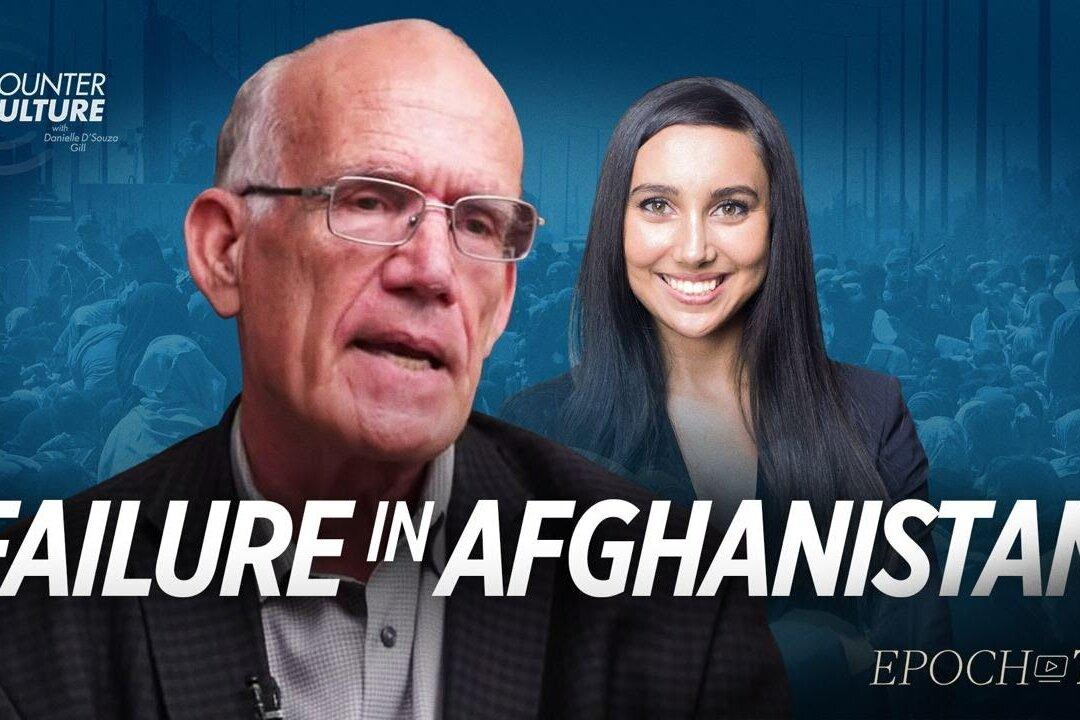There’s so much to unpack in “Failure in Afghanistan” that it’s difficult to know where to begin discussing this episode of “Counterculture.” While Danielle D’Souza Gill, along with guest Victor Davis Hanson of the Hoover Institute, focus largely on Biden’s catastrophic withdrawal from Afghanistan, they also touch on a number of other Democratic positions and focuses that tangentially played a role in the most embarrassing military failure for the United States since Vietnam.
D’Souza Gill’s opening monologue focuses exclusively on all the ways in which President Joe Biden thoroughly botched our exit from Afghanistan and gives a great, brief run-down of just how bad it’s really been. It sets up the various topics she and Hanson discuss in depth later on and is the kind of opening monologue that the 85 percent of Democrats who still think Biden is doing a great job ought to watch immediately. She runs through an awful kind of greatest hits of the last week in regards to the withdrawal and the images we’ve seen in its wake, such as the men who clung to the C-17 transport plane before plummeting to their death or the civilians beaten bloody in the streets. She talks about the media, and how even the likes of CNN have stopped running cover for Biden because what’s happening in Afghanistan is just that bad. She discusses how administration officials are trying to dodge questions, how none of them seem to understand that American citizens aren’t unhappy with the fact that we left, but how we withdrew, as well as the administration’s continued efforts to turn this mess back on Trump.
We’ve all seen Biden brush off criticism about the withdrawal with lines like, “It was always going to be messy,” though unlike D’Souza Gill I think his stubborn refusal to hear what people are really upset about isn’t mere incompetence. Rather, given the establishment’s propensity for gaslighting, it seems to me to be a desperate attempt to change the narrative to “my critics just didn’t want me to leave,” only the media isn’t propping them up this time. They keep repeating it in the hope of shifting the conversation, but now that journalists are turning on them they’re as stranded as the thousands of Americans and allies who are stuck trying to get to the Kabul airport. Many of them are never going to make it out of the country, and some of them have already been killed.
D’Souza Gill also brings up the horrific plight of women in Afghanistan who have gone from living in the 21st century to the 11th century nearly overnight. “The Guardian” reports that there are no women on the streets in Kabul anymore, one topic our mainstream media is still largely skirting, since addressing it would require pressing leaders like Nancy Pelosi to do more than issue stern statements about how we hope the Taliban will suddenly join the modern era and give women a place at the table. Heck, they’d have to pin down Kamala Harris to a more in-depth response than simply, “We’re aware of the issues in Afghanistan and they’re our top priority.” The populace has already realized the emperor has no clothes. It would be too much of a paradigm shift to reveal that the Democrats as a whole don’t care at all about women’s rights.
D’Souza Gill then touches on just how much military equipment we left behind when we abandoned Bagram Air Force Base and that the Biden administration apparently didn’t consider what the Taliban would do if they got their hands on those weapons (despite claiming they fully expected the country to eventually fall to the Taliban). You’d think as a thank you for all those fancy new armaments the U.S. citizens bought them that the Taliban would be more willing to let our people leave the country, but they are the literal definition of barbarians so we shouldn’t hold our collective breath. Contrary to Biden’s claim that he did everything perfectly and there was no other possible way to handle this exit, D’Souza Gill gives some very specific examples of alternative exit strategies that sound pretty darned reasonable, and a lot like what the previous administration would have done. Instead, we’re now stuck asking terrorists “pretty please” as the official strategy to evacuate our citizens and allies now trapped behind enemy lines.
For the millennials who are too young to really understand why we went to Afghanistan in the first place, D’Souza Gill gives a little history lesson on the initial mission, then why we stayed there. She explains how we trained the Afghan Army in such a way that they were always going to be crippled if we left, and how swampy and corrupt the whole “nation-building” exercise turned very quickly, resulting in billions of wasted dollars. We spent $28 million alone buying woodland camouflage for the Afghan Army to fight the Taliban in a desert for no other reason than the Afghan minister of the defense who oversaw the purchase liked the pattern. Yes, really. Given everything we know in just a week about how much money we wasted, how ill-prepared the Afghans were to fight without us there to support them, how difficult it is for our citizens to get to the Kabul airport to be evacuated, and how deplorably the Afghans who helped us are being treated, Biden’s series of speeches on this topic now that he’s no longer flying off to Delaware are not only tone-deaf but offensive.
She closes out her monologue underscoring the way Biden’s actions have weakened us on the world stage, which was what his former boss, President Barack Obama, always wanted. She points out, correctly, that the Democrats don’t care about anything other than achieving that goal. They don’t care about all the innocent Afghans who are going to be killed because of our actions. They don’t care about the U.S. veterans who are devastated and asking themselves what the freaking point was. They don’t care about losing the trust of our NATO allies, who are currently venting their spleen all over Europe. They don’t care about the potential for Afghanistan to become a terrorist hotbed again, so long as the world sees that we are no longer the dominant power. To them, the ends justify the means, no matter how horrific and callous those means are.
Having completed her opening, D’Souza Gill brings on Hanson, who spends the remaining run time (the bulk of the episode) demonstrating why he’s a Hoover Institute Senior Fellow. Unlike the talking heads for the administration, Hanson has specific responses to every question D’Souza Gill poses, and he doesn’t even hesitate. He lists who among the administration can’t answer even the simplest questions and should be able to, then lists the simple questions they can’t answer. He bounces easily from who is to blame to why there should be resignations, comparing the failure in military advice in Afghanistan to what happened to the British in the Falklands back in the 1980s. It’s an appropriate comparison, and we definitely should see some resignations, but I doubt we’re going to; not with how committed our current military leaders are to pushing woke ideology and rooting out white rage among the troops. When your mission isn’t to succeed in combat but to make sure everyone knows when to use the right pronouns, I’d expect a minor thing like a 20-year military occupation ending in total collapse and utterly betraying our foreign allies doesn’t instill enough shame to make you resign.
Hanson moves on to how Biden has been blaming everyone but himself since the second he said, “the buck stops here,” including Trump, Obama, his own military, the Afghan Army, his advisors—basically everyone outside of his dry cleaner. He asserts that had this kind of disaster happened on Trump’s watch he’d have been impeached yet again, and there’s no doubt he’s right. It remains to be seen if the Republicans can take back the House and pick up any Senate seats in 2022, though it seems like a long shot that impeachment would ever be on the table for Biden. It also seems like a long shot that he’ll still be President in 2022, but I digress.
D’Souza Gill and Hanson discuss the issue of refugees next and how we could adequately vet and resettle them. Given the ongoing crisis at our southern border, it isn’t likely that the Biden administration would go through the kind of thorough process Hanson outlines as opposed to running a quick background check and letting them in. On the subject of whether we won or lost in Afghanistan, Hanson believes it depends on the definition of the mission, giving a brief but thorough breakdown of how the war evolved over the years to become something that was ultimately unsustainable—nation-building. Hanson reminds the viewer that outsiders going all the way back to Alexander the Great have been trying to rule over Afghanistan and have only ever succeeded in holding the plains. A country that has been dysfunctional since the 4th century B.C. is probably always going to be dysfunctional.
From here they switch into broader topics, like the CCP’s opinion of us (they hate us, of course, but now they’re openly mocking at us); whether Hanson thinks the Taliban is going to listen to Nancy Pelosi’s calls for them to include women in positions of power (ha ha—no); and the Taliban’s utter lack of respect for us (who could blame them at this point). Hanson sees a bleak future for Afghan women and those who helped us and will be left behind, while D’Souza Gill points out that this is a perfect juxtaposition of just how bad much of the rest of the world is compared to us.
Woke ideology, which Hanson considers a mass hysteria, comes up next, which is in fact related to the overall calamity in Afghanistan, even if it doesn’t appear to be on the surface. Woke ideology demands sameness among everyone, which ultimately results in everyone being the same level of mediocre except for the people at the top of the pyramid. It only makes sense that when you’ve got a woke general running things like Mark Milley. This conversation transitions to the other insidious influence among those in the intelligence community and government employment overall: the incestuous nature between government and the private sector. It used to be looked down upon for bureaucrats to leave office to join the private sector, such as military contractors. Not only is it no longer looked down upon, there’s now a trend in the opposite direction as well, with private sector higher-ups moving into the government and bringing their woke ideology with them. The two trends have managed to create a nice little ruling class sneering down on the rest of us.
Hanson has some definite ideas on how the woke have managed to so thoroughly infect our institutions, from education to Hollywood to Big Tech. Hanson postulates that even though the woke agenda is only embraced by a decided minority in the country, they are able to hold onto these levers of power because the majority are off living their lives. They have jobs. They have kids. They go to church. If they have a Twitter account, they rarely check it. They’re free from the 24/7 indoctrination on social media and from the entertainment industry. They’ve also been dismissed as deplorables thanks to globalism, while the woke-infected education system slowly turns their children against them.
This is a wonderful episode of “Counterculture” thanks to D’Souza Gill’s setup and Hanson’s analysis. Victor Davis Hanson is the perfect example of why wokeism is such a terrible prism through which to view the world, since this interview would be dismissed outright as irrelevant because he’s an old white male. For that alone, this episode deserves a like and a share, especially to show any left-leaning friends and family that old white males can and do have tremendous insight to share on current events. With Biden continuing to give dismissive speeches about Afghanistan’s collapse and whispers starting that this might be the end of NATO, it’s important to keep this travesty front and center. We’ve got a long way to go until it’s over, and it’s only going to get worse.
Follow EpochTV on social media:




